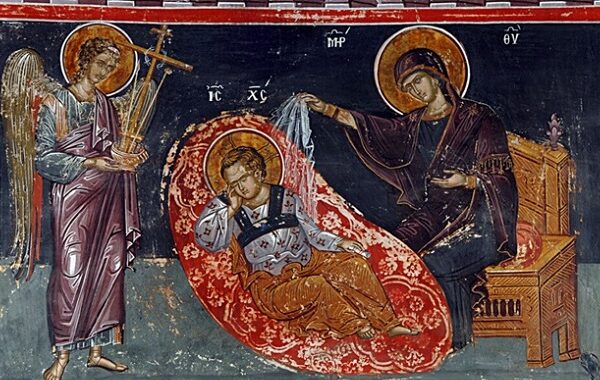‘She will bear a son and you will call his name Jesus’
22 December 2021‘She will bear a son and you will call his name Jesus, for he shall save his people from their sins’ (Matth. 1, 21). With these words, the Angel of the Lord revealed to righteous Joseph the purpose of the Nativity in the flesh of the Son and Word of God which we’re preparing to celebrate again this year, within the spiritual climate of our holy Church. Christmas, then, is approaching.
First. In his infinite love, God became a human person in order to save us from the destructive mission of the devil and to raise our fallen nature. Therefore, with his incarnate dispensation he makes us his children again by grace, siblings and coheirs in his heavenly kingdom. This is why the pillar of the Church, Saint Athanasios the Great, reminds us: ‘for he became human in order that we might be made gods’ [1]. It follows that the task of our salvation begins with his nativity in the flesh. And whereas the wages of sin are spiritual death, ‘life eternal in our Lord Jesus Christ is a gift of God’ [2] as Saint Paul, the Apostle of the Gentiles, puts it.

Second. The task of the divine dispensation regarding our salvation continues after the incarnation. Through his teaching Christ offers those in darkness and the shadow of death the truth of the faith which liberates and saves: ‘you will know the truth and the truth will set you free’ [3].
Christ saves us by his sacrificial death on the cross on the hill of Golgotha, because through this sacrifice he eliminated ‘him who holds the dominion of death, that is the devil’ [4]. Through his resurrection he raised up the whole of the human race, since, ‘when Christ rose from the dead, he became the first-fruit of the departed’ [5]. And through his glorious ascension into heaven he lifted human nature up to his royal throne itself.
Faced with this great, inconceivable act of love on the part of God towards us, from the Nativity, to the Crucifixion, the Resurrection, Ascension and Pentecost, our duty must be to act precisely in accordance with this offering of God’s infinite love. Saint Gregory the Theologian points out this duty to us: ‘Let us become like Christ, since Christ became like us; let us become gods for him, since he became human for us’ [6]. This tremendous axiom from Saint Gregory means that, in our whole life, our thoughts, our will and our actions should be in harmony with God’s love. God is charitable; we also are charitable. God is full of love, mercy and kindness, we also are merciful, in accordance with his command: ‘Therefore be merciful as your Father is merciful’[7].
God humbled himself so that we could clothe ourselves in the garment of his humility, which gives us the opportunity for communion with him. With these thoughts, which come from my heart, and my unfailing concern for your progress and prosperity by God’s grace, I’d like to remind you of the following, as regards the great feast of the Twelve Days:
- Church attendance from the beginning of the service will bring us a special experience, an understanding of the Holy Sacraments, the power to enact God’s really very simple commandments, and participation in the life of Christ, since the center of the feast of Christmas is Christ himself.
- Participation in the holy services during these days, especially the sacrament of the Divine Eucharist- after suitable preparation- helps us experience the holy Twelve Days in a spiritual manner, far removed from the secular spirit of prodigality, consumption, individualism and unbelief.
- Offering our time to our neighbor, giving love, comfort, companionship, kindness support, the light of Christ, optimism and hope will fill us with the grace and joy which the child Jesus gives to the meek and humble in heart.
So come during these days and let us enjoy the real pleasure which is concealed in the cave at Bethlehem.
Come and let us take ‘the things of paradise within the cave’ [8], as the holy hymnographer so beautifully puts it.
Here we’ll gain riches and slake our thirst spiritually. We’ll overcome our consternation at the thought of death and we’ll celebrate Christmas not only once a year, but always. Everlasting Christmas!
I hope, from the bottom of my heart, that Christ will grant us this now, as his Nativity approaches.






